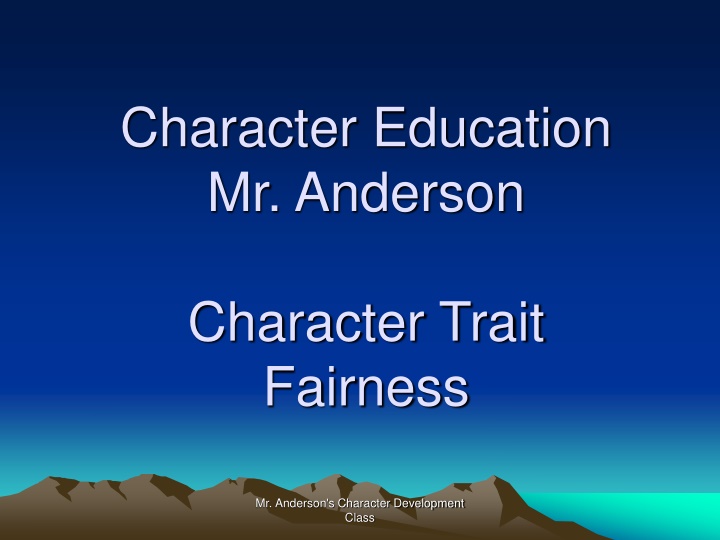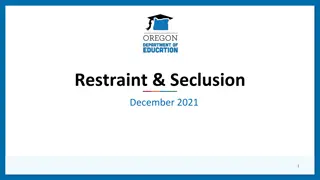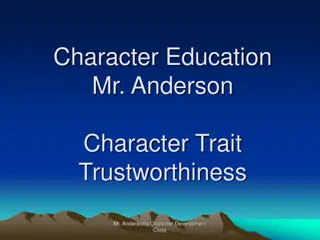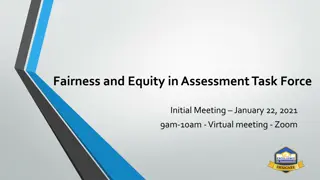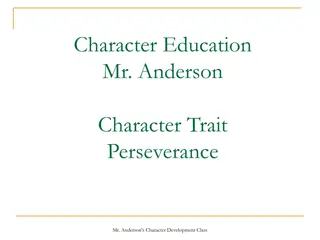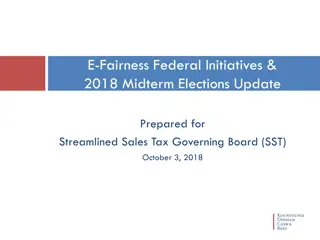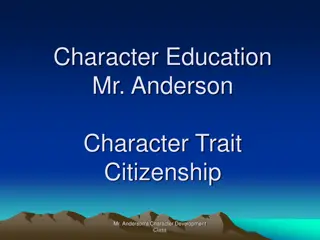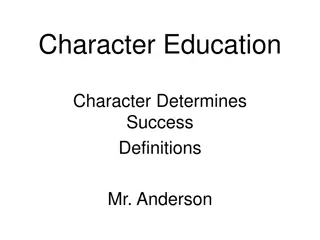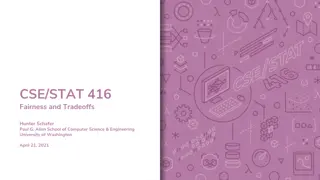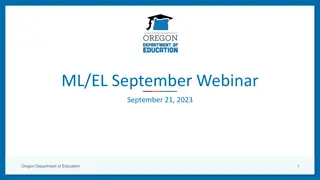Character Education: Understanding Fairness and Equity in Mr. Anderson's Class
Explore the core character traits of fairness and equity taught in Mr. Anderson's Character Development Class. Fairness is exemplified through impartial treatment, sharing, and abiding by rules. Equity involves correcting mistakes, not taking advantage of others, and ensuring fair shares. Discover key words such as open-mindedness, justice, and consistency that define these concepts.
Download Presentation

Please find below an Image/Link to download the presentation.
The content on the website is provided AS IS for your information and personal use only. It may not be sold, licensed, or shared on other websites without obtaining consent from the author.If you encounter any issues during the download, it is possible that the publisher has removed the file from their server.
You are allowed to download the files provided on this website for personal or commercial use, subject to the condition that they are used lawfully. All files are the property of their respective owners.
The content on the website is provided AS IS for your information and personal use only. It may not be sold, licensed, or shared on other websites without obtaining consent from the author.
E N D
Presentation Transcript
Character Education Mr. Anderson Character Trait Fairness Mr. Anderson's Character Development Class
Fairness Definition: Demonstrating impartial, unbiased, and equitable treatment of others. Mr. Anderson's Character Development Class
Fairness Definition: Taking turns, sharing, and listening to what others have to say. Mr. Anderson's Character Development Class
Fairness Example I show fairness when I take only my share. Mr. Anderson's Character Development Class
Fairness Example I am fair when I play by the rules. Mr. Anderson's Character Development Class
Fairness Words Open-minded Justice Equity Consequences Prejudice Favoritism Consistent Certain Proportional Impartiality Mr. Anderson's Character Development Class
Equity Definition: Not taking advantage of others and making correction of mistakes. Mr. Anderson's Character Development Class
Equity Example An equitable person admits and corrects mistakes promptly and voluntarily and expects others to do the same. Mr. Anderson's Character Development Class
Equity Example An equitable person doesn t take advantage of the weaknesses or ignorance of others. Mr. Anderson's Character Development Class
Equity Example An equitable person doesn t take more than his/her fair share. Mr. Anderson's Character Development Class
Equity Example An equitable person doesn t blame others unfairly. Mr. Anderson's Character Development Class
Fairness Quotes The probability that we may fail in the struggle ought not deter us from the support of a cause we believe to be just. -Abraham Lincoln Mr. Anderson's Character Development Class
Fairness Quotes Reconciliation should be accompanied by justice, otherwise it will not last. While we all hope for peace it shouldn t be peace at any cost but peace based on principle, on justice. -Corazon Aquino Mr. Anderson's Character Development Class
Fairness Quotes The foundation of justice is good faith. -Marcus T. Cicero Mr. Anderson's Character Development Class
Fairness Quotes Time is the justice that examines all offenders. -William Shakespeare Mr. Anderson's Character Development Class
Fairness Quotes Justice is a temporary thing that must at last come to an end; but the conscience is eternal and will never die. -Martin Luther Mr. Anderson's Character Development Class
Fairness Quotes Nothing is to be preferred before justice. -Socrates Mr. Anderson's Character Development Class
Fairness Quotes Justice is the ligament which holds civilized beings and civilized nations together. -Daniel Webster Mr. Anderson's Character Development Class
Fairness Quotes Justice and power must be brought together, so that whatever is just may be powerful, and whatever is powerful may be just. -Blaise Pascal Mr. Anderson's Character Development Class
The Donkey and the Lion. -Aesop Mr. Anderson's Character Development Class
Discussion Questions for The Donkey and the Lion 1. How did the lion get away with taking all of the food? Mr. Anderson's Character Development Class
Discussion Questions for The Donkey and the Lion 2. Have you ever played with someone who made up their own rules? Mr. Anderson's Character Development Class
Discussion Questions for The Donkey and the Lion 3. How does it feel to be cheated or taken advantage of? Mr. Anderson's Character Development Class
Discussion Questions for The Donkey and the Lion 4. Why is it important to play by rules that all players agree upon? Mr. Anderson's Character Development Class
Discussion Questions for The Donkey and the Lion 5. When playing a game or participating in a group activity, what can you do to make sure that everyone is treated fairly? Mr. Anderson's Character Development Class
Watch your thoughts; they become words. Watch your words; they become actions. Watch your actions; they become habits. Watch your habits; they become character. Watch your character; for it becomes your destiny!!! Mr. Anderson's Character Development Class
This powerpoint was kindly donated to www.worldofteaching.com http://www.worldofteaching.com is home to over a thousand powerpoints submitted by teachers. This is a completely free site and requires no registration. Please visit and I hope it will help in your teaching. Mr. Anderson's Character Development Class
